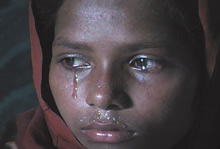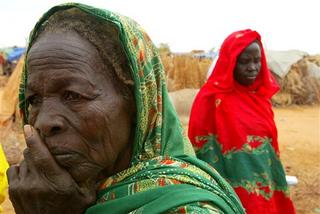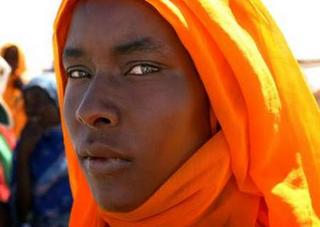The Grammar of Faith:
Watching and Waiting
For Sunday October 7, 2007
Lectionary Readings (Revised Common Lectionary, Year C)
Lamentations 1:1–6; 3:19–26 or Habakkuk 1:1–4, 2:1–4
Psalm 137 or Psalm 37:1–9
2 Timothy 1:1–14
Luke 17:5–10
 |
Darfur refugee. |
"Welcome to hell!"
Thus did retired Colonel John Anderson greet Brian Steidle when his helicopter landed at the Nyala airport in southern Darfur. Steidle had arrived to replace Anderson on a team that was monitoring the atrocities in Sudan, the largest country in Africa, and as he would learn in the coming months, Anderson's greeting was no joke.
Steidle's book, The Devil Came on Horseback; Bearing Witness to the Genocide in Darfur (2007), might be short on history, culture, and politics, but it's nevertheless a comprehensive documentation of Darfur's epic tragedy. It's based upon his photo archive of 3,000 pictures, an audio journal he made on an MP3 player, personal notes, emails, intelligence collected from some 30 NGOs, and about 80 official reports that his team wrote.
Steidle bears witness to the horrors he documented on a daily basis as a leader for a monitoring team with the African Union — children who had been shackled together, raped, and then burned alive; gang rape of women and girls regardless of age; grotesque dismemberment of victims; the total burning of hundreds of villages; the bull-dozing of camps for internally displaced victims; starvation and disease; mass graves; jets and helicopter gunships slaughtering civilians in the market place; and endless cases of pillage and plunder. One of the most chilling pieces of evidence in Steidle's book is a government document specifying their official policy of ethnic cleansing.
About 300–500,000 black African Muslims have been killed by the Sudanese army and police, and the janjaweed militia (literally "devil on a horse") that Omar Bashir's government has funded, trained (complete with graduation exercises), armed, and closely collaborated with in attacks. Another 2-3 million people have been internally displaced. The Sudanese government knew that it could continue the genocide with impunity because the international community would do nothing.1
Darfur today gives us some idea about how the ancient Hebrews felt after Babylonian hordes ransacked Jerusalem. The dirges from Lamentations describe the slaughter and destruction—depopulated villages, abandoned streets that once bustled with business, refugees deported to foreign lands, starvation, massive unemployment, and the humiliation and helplessness that result from total subjugation. Where was God in such death and destruction?
 |
Darfur refugee. |
Exiled to the banks of the Tigris and Euphrates rivers in Babylon, the Psalmist raged for revenge: "O daughter of Babylon, doomed to destruction, happy is he who repays you for what you have done to us—he who seizes your infants and dashes them against the rocks" (137:8–9). For a long time I found this verse embarrassing, but I've come to appreciate it as an authentic cry of righteous indignation. Who wouldn't beg for divine retribution for psychopathic dictators like Pol Pot, Omar Bashir, Saddam Hussein, or Robert Mugabe? Still, there's a very thin line between the prayer for divine retribution and the lust for human revenge, and perhaps the psalmist is a classic case of the oppressed victim becoming the new oppressor.
Whereas the Psalmist raged, Habakkuk complained that God felt silent and aloof: "How long, O Lord, must I call for help, but you do not listen? Or cry out to you, 'Violence!' but you do not save?" (1:1). And why would God choose wicked Babylon to punish elect Israel? “O Lord, you have appointed them to execute judgment; O Rock, you have ordained them to punish” (1:12–13). Where was the moral calculus in all of this?
“The just shall live by faith,” God responded (2:4). That's not what Habakkuk wanted to hear; he says that it made his heart pound, his lips quiver, and his legs tremble. But he nevertheless chose faith and decided to watch and wait:
Though the fig tree does not bud
and there are no grapes on the vines,
though the olive crop fails
and the fields produce no food,
though there are no sheep in the pen
and no cattle in the stalls,
yet I will rejoice in the Lord,
I will be joyful in God my Savior. (3:16–18)
This was clearly no plea bargain with God or a quid pro quo; Habakkuk's faith didn't depend upon a favorable outcome (cf. Daniel 3:17–18).
In the Gospel this week Jesus invites us to choose the paradox of faith over the logic of doubt. Mustard seed faith, he says, can move mountains and mulberry trees (Luke 17:6 = Mark 11:23 = Matthew 21:21). What might Jesus mean by such obvious hyperbole?
 |
Darfur refugee. |
My ninth grade English teacher, Estelle Tilley, taught us that a transitive verb always requires an object ("I lifted the rock"), unlike an intransitive verb that doesn't require an object ("I sleep."). The transitive verb "faith" must have an object. It's almost impossible to say "I believe," and leave it at that. Believe who or what? Rather, we say "I believe that. . . ." Jesus turned our focus away from the faith by which one believes (fides qua creditur), the subjective act of the believer, to the faith that is believed (fides quae creditur), to the objective truth of who or what we believe. And so the tiniest act of faith in the unconditionally good God gives us hope.
Faith believes that despite all the bad stuff in the world or in my life—bad dreams, bad luck, bad choices, bad health, bad dictators—nothing can separate me from God's love; that God knows my every need and desire; that I can and should live gladly because of the knowledge of his love; that I can accept that I'm accepted; that I can feel at home in the world; and that God wills me nothing but good.
Faith isn't artificial optimism. It's not a leap into the irrational, or "believing what you know ain't true." Rather, it's what you give your heart to, and at least in this sense everyone has faith in someone or something, even the atheist. It means to keep your eyes wide open like Habakkuk with expectation, watching and waiting. It's the beggar's empty hand that entrusts one's self to a good God. Faith is "the assurance of things hoped for, the conviction of things not seen" (Hebrews 11:1), that which enables us to journey on even though we can't see far down the road.
For further reflection:
* Mark 9:24, "Lord I believe, help my unbelief."
* Psalm 37:7, "Be still before the Lord and wait patiently for him."
* Lamentations 3:24,26, "I say to myself, 'The Lord is my portion; therefore I will wait for him.' It is good to wait quietly for the salvation of the Lord."
* Habakkuk 2:3, "..though it linger, wait for it; it will certainly come and not delay."
[1] See too the documentary film Darfur Diaries (2006).





